Natalie Diaz
Of Course She Looked Back
Is there a character (from history, politics, or literature) whose story you want to tell from a new perspective?
This poem is told from the point of view of “Lot’s wife,” a biblical character who was turned into salt because she looked back to see the burning of Sodom, her home city. The poet shows us what Lot’s wife sees: towers swaying, guitars popping, dogs weeping and roosters howling. By mixing the modern with the everlasting, Lot’s wife is humanized and justified.
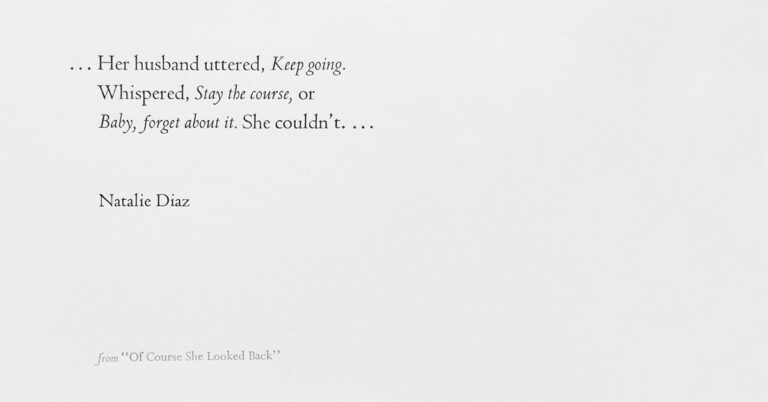
Image by Expedition Press/Expedition Press, © All Rights Reserved.
Guest
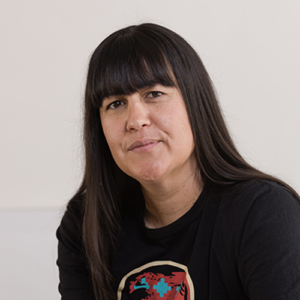
Natalie Diaz is Mojave and an enrolled member of the Gila River Indian Tribe. She was a 2018 MacArthur Foundation Fellow and has written two books of poetry, When My Brother Was an Aztec, and Postcolonial Love Poem. She teaches at the Arizona State University Creative Writing MFA program.
Transcript
Pádraig Ó Tuama, host: My name is Pádraig Ó Tuama, and ever since I was a child, I was fascinated and sometimes frightened by stories of the Bible. And the older I got, the more I turned to poets to help me find inroads and corners in the Bible, to help me explore the stories of characters, rather than just theologians.
[music: “Praise The Rain” by Gautam Srikishan]
“Of Course She Looked Back” by Natalie Diaz:
“You would have, too.
From that distance the shivering city
fit in the palm of her hand
like she owned it.
She could’ve blown the whole thing—
markets, dancehalls, hookah bars—
sent the city and its hundred harems
tumbling across the desert
like a kiss. She had to look back.
When she did, she saw
pigeons glinting like debris above
ruined rooftops. Towers swaying.
Women in broken skirts
strewn along burned-out streets
like busted red bells.
The noise was something else—
dogs wept, roosters howled, children
and guitars popped like kernels of corn
feeding the twisting blaze.
She wondered had she unplugged
the coffee pot? The iron?
Was the oven off?
Her husband uttered Keep going.
Whispered Stay the course, or
Baby, forget about it. She couldn’t.
Now a bursting garden of fire
the city bloomed to flame after flame
like hot fruit in a persimmon orchard.
Someone thirsty asked for water.
Someone scared asked to pray.
Her daughters or the crooked-legged angel,
maybe. Dark thighs of smoke opened
to the sky. She meant to look
away, but the sting in her eyes,
the taste devouring her tongue,
and the neighbors begging her name.”
[music: “What Did You Not Hear” by Gautam Srikishan]
Ó Tuama: This poem is taking part as a new way of telling the old, told aftermath of the story of Sodom. And the story of Sodom is about messengers, angels, arriving at this city of Sodom and who were taken in by this character, Lot. And the messengers had a message for the city, but the inhabitants didn’t want to hear it. And the text says that all the men of the city, from the oldest to the youngest, crowded outside the house of Lot, where these messengers were staying, and called for the messengers to be brought out, so they could be brutalized by all the men. And so the angels called down destruction on the city. But they helped Lot and his family escape. And as they were leaving the city, they were all told not to look back at the burning city, but Lot’s wife, whose name we don’t know, she did, and she was turned into a pillar of salt. And Natalie Diaz has written this brilliant poem, describing Lot’s wife, “Of Course She Looked Back.” And this is the landscape of the poem, this woman who has fled a burning city with her family, who was looking back at this city.
And what Natalie Diaz has done has been to go into this poem and to change the point of view. So the opening line is quite brilliant. “Of course she looked back” — “You would have, too.” So there is a remarkable expansiveness and an inclusion; she’s not defending herself, she’s saying, “This is what anybody would have done.” And “From that distance the shivering city / fit in the palm of her hand / like she owned it.” “She could’ve blown [it] […] like a kiss.” And we see a new way of looking at a city, a city as a small thing, a city as a thing that could be blown away by some violent wind or, somehow, that could also be held tenderly, like something in a hand or like blowing a kiss.
[music: “What Did You Not Hear” by Gautam Srikishan]
Ó Tuama: I think the destroying of the city of Sodom can be understood in a certain way to be a motif for the erasure of city and places and peoples and language. And Natalie Diaz has modernized the story in the way that she speaks about coffeepots and electricity and the iron and the oven. And by doing that, she brings us into a sensibility, to say, this isn’t about one story that happened once. This is about something that happens, and has happened, many times.
Natalie Diaz was born and raised in the Fort Mojave Indian village in Needles, California, so she is Mojave and is an enrolled member of the Gila River Indian Tribe. She’s a linguist, too, and she’s also worked with the last speakers of Mojave and directed a language revitalization program. And within the context of this, you see ways within which so much of what is important to her and who she is and the identities that she holds have been erased through systematic policies that seem to punish people who want to raise their voice and increase the amplification of voices of protest. And, by taking this unnarrated character of Lot’s wife, she’s taking this integrity of this woman from the biblical story and using her determination to turn around and to face and to bear witness to what’s being destroyed, as a way of saying, this didn’t just happen once, this is happening many times.
[music: “First Grief, First Air” by Gautam Srikishan]
Ó Tuama: The story of Sodom is a story about how men brutalize other people of all genders when somebody comes with a message that large groups of men don’t want to hear. You see this happening over and over again, in wars as well as in places that say that they’re in peace. And Natalie Diaz is also amplifying the story of queer women of color in this. This poem is a lookback into a story that has been used to condemn queer people, and by her inserting tenderness, inserting kindness, inserting intelligence and integrity into the gaze of Lot’s wife, she’s also introducing a queering and a querying point of view into the story of Sodom and what’s happening in it.
That image toward the end, of “[d]ark thighs of smoke opened / to the sky” — this poem is culminating toward the end and wondering, what’s being given birth to here? What is this story, what is this burning city, going to give birth to in the future? And rather than this being a story that condemns queer people, Natalie Diaz finishes us with something of a poem that doesn’t quite have resolve, because Lot’s wife, in this poem, “meant / to look away, but the sting in her eyes, / the taste devouring her tongue, / and the neighbors begging her name” — the sight, the taste, and the knowledge of neighbors who were calling out for help —the poem finishes here. It finishes on a lament, and it finishes, I think, by highlighting that challenge, to say, who suffers on behalf of other people’s ideologies?
[music: “KeoKeo” by Gautam Srikishan]
Ó Tuama: There’s so much reference to existing families in this beautiful poem, which is a lament, really. And I think what Natalie Diaz is doing is changing the way that we think of the city of Sodom. The city of Sodom is narrated through the actions of its men, from the youngest to the oldest. It’s so interesting, in the narration of the Genesis text, how it keeps on referring to “the men of Sodom.” All of them, apparently, all of them were involved in this attempted abduction and brutalization of these angels. And what we hear in Natalie Diaz’s poem is about the women, “women in skirts.” We also hear about children. We hear that this is a place where music was played. We hear about animals. We hear about it as a place of domesticity; we think about coffee and iron and clothes and cooking. We think about this as a place of agriculture, where there would’ve been persimmon orchards. We hear about this as a place where people are, like all people, thirsty or turning to prayer. And this introduces new storylines into the story of Sodom. It decolonizes it, in a certain sense, from a single story that’s been used about the city of Sodom and a city being defined by the men in that city. This is saying, there were women in that city, too.
[music: “Careless Morning” by Gautam Srikishan]
Ó Tuama: The way that the story of Sodom is told is quite matter of fact. This happens; this happens. What Natalie Diaz does is to speak here about a city in pain. She populates the city markets and dance halls and hookah bars, and then, as she speaks about the destruction of this city, she speaks about towers swaying, and streets that would’ve been filled with people, that are now places of chaos and noise and destruction and bursting gardens of fire. And the gaze in this is a gaze that is saying, who is doing this? Because the story is told that God is doing this and that this, somehow, is being done for good. And she is protesting against that. In a way, she is burning herself up by going in and looking back to the God who was justifying all this, and saying, this is worthy of being protested.
I think one of the things that this poem invites us to do is to look into this received story in a way where we honor the gift of bearing witness, and we also honor the validity of the protest of bearing witness. This story is an intervention into the idea that a story from the bible should be taken as it is, and Natalie Diaz has interrupted this story with a character who’s often ignored or just used as a trope within the story — “Don’t be like Lot’s wife and be turned into salt.” She here is turning Lot’s wife’s words into ink and into voice and into insight and into challenge and into its own protest, to challenge the idea that the story as received should be received like that, always and forever. And so this poem invites us to look at received stories from new points of view.
[music: “At Dusk” by Gautam Srikishan]
“Of Course She Looked Back” by Natalie Diaz:
“You would have, too.
From that distance the shivering city
fit in the palm of her hand
like she owned it.
She could’ve blown the whole thing—
markets, dancehalls, hookah bars—
sent the city and its hundred harems
tumbling across the desert
like a kiss. She had to look back.
When she did, she saw
pigeons glinting like debris above
ruined rooftops. Towers swaying.
Women in broken skirts
strewn along burned-out streets
like busted red bells.
The noise was something else—
dogs wept, roosters howled, children
and guitars popped like kernels of corn
feeding the twisting blaze.
She wondered had she unplugged
the coffee pot? The iron?
Was the oven off?
Her husband uttered Keep going.
Whispered Stay the course, or
Baby, forget about it. She couldn’t.
Now a bursting garden of fire
the city bloomed to flame after flame
like hot fruit in a persimmon orchard.
Someone thirsty asked for water.
Someone scared asked to pray.
Her daughters or the crooked-legged angel,
maybe. Dark thighs of smoke opened
to the sky. She meant to look
away, but the sting in her eyes,
the taste devouring her tongue,
and the neighbors begging her name.”
[music: “Praise The Rain” by Gautam Srikishan]
Lily Percy: “Of Course She Looked Back” comes from Natalie Diaz’s book When My Brother Was An Aztec. Thank you to the Permissions Company, on behalf of Copper Canyon Press, who gave us permission to use Natalie’s poem. Read it on our website, at onbeing.org.
Poetry Unbound is Chris Heagle, Erin Colasacco, Serri Graslie, Eddie Gonzalez, Lilian Vo, Christiane Wartell, Karen Navarre, Karyn Towey, Sue Ariza, and me, Lily Percy. Our music is composed and provided by Gautam Srikishan and Blue Dot Sessions. This podcast is produced by On Being Studios, which is located on Dakota land. We also produce other podcasts you might enjoy, like On Being with Krista Tippett, Becoming Wise, and This Movie Changed Me — find those wherever you like to listen or visit us at onbeing.org to find out more.
Books & Music
Recommended Reading
The On Being Project is an affiliate partner of Bookshop.org and Amazon.com. Any earnings we receive through these affiliate partnerships go into directly supporting The On Being Project.






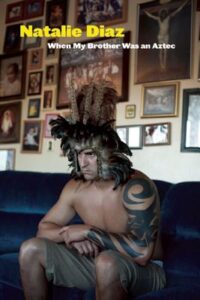
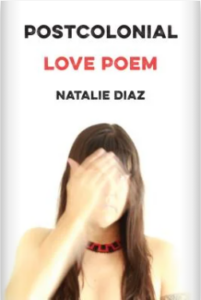


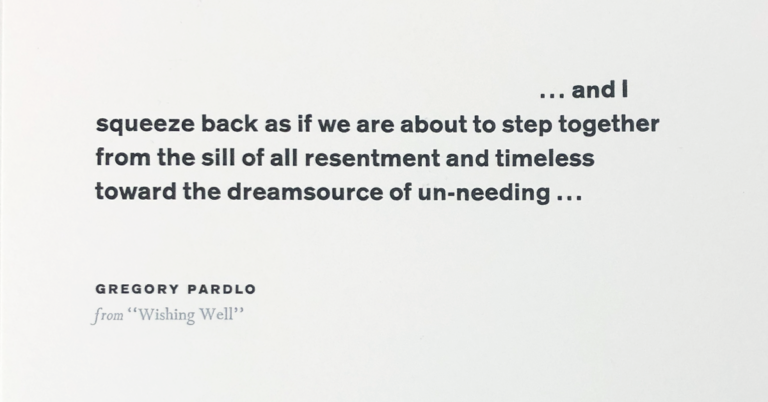
Reflections